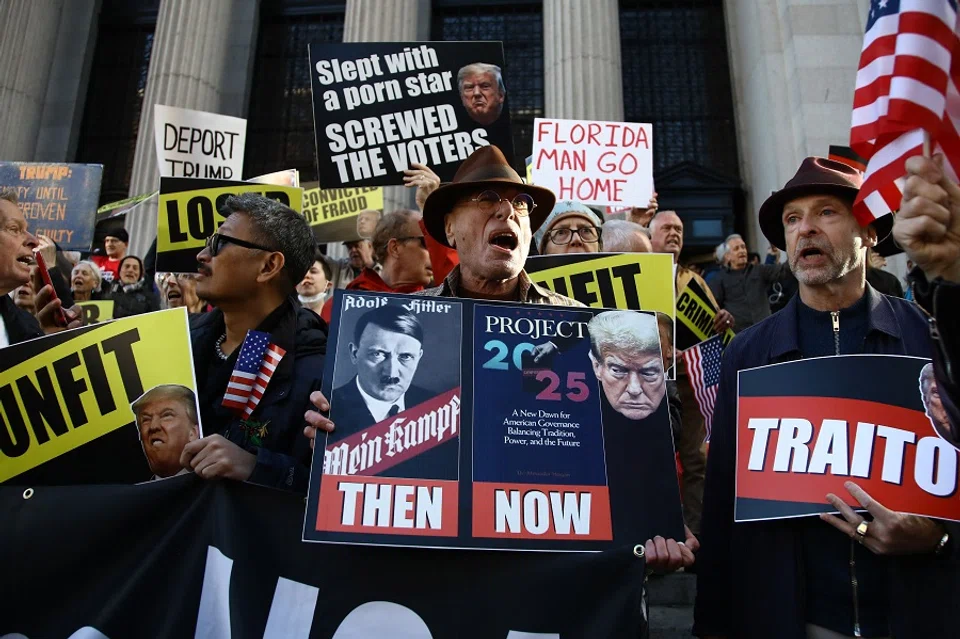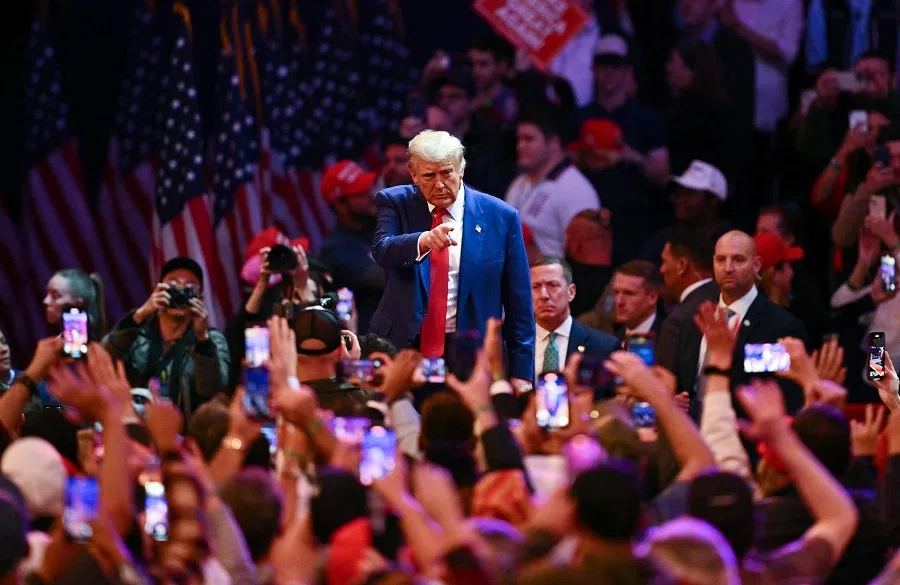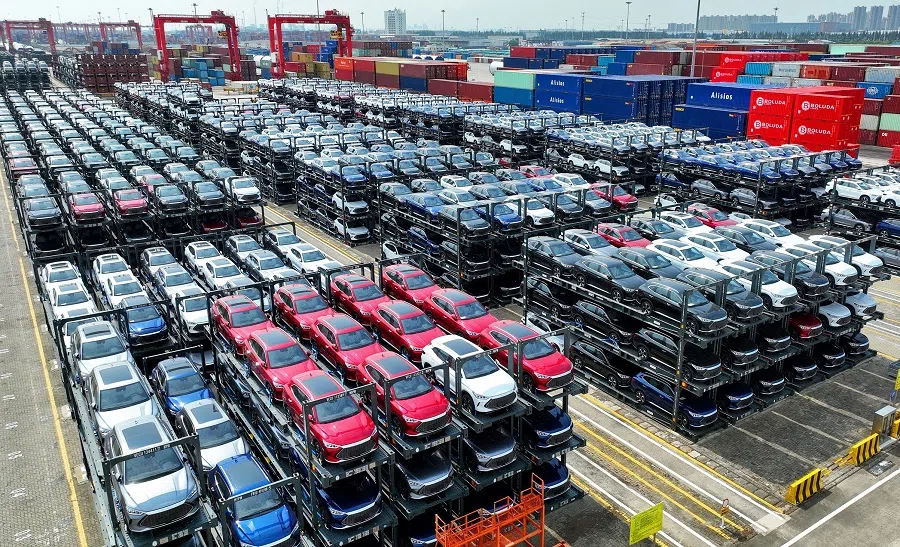Quick fixes and false promises: The rise of populism in the West
Commentator Chen Kuohsiang says that the rise of the far right in the West offers seemingly simple solutions to current issues such as immigration, economic difficulties and military conflicts, but it does not get to the root of the problem.

What should be done about American products’ lack of international competitiveness and the shrinking of American manufacturing? Donald Trump’s response: “Impose 10% to 20% tariffs across the board on most imports.”
What about the Russia-Ukraine War? Trump’s response: “I’ll end it within 24 hours upon my inauguration, I’m buddies with Putin.”
As China may invade Taiwan, will the US use force against it? Trump’s response: “I have a solid relationship with Xi Jinping, he respects me and he knows I’m crazy.” What if the invasion does happen? Trump’s response: “Increase tariffs on Chinese products to 150% to 200%.”
How can inflation be suppressed? Trump’s response: “Step up efforts to extract oil and coal to lower energy costs.” What should be done about the huge increase in immigrants entering the US? Trump’s response: “Forced deportation.”
Nevertheless, many people believe in him, mainly because he comes across as a strong and domineering leader who would take a hard-as-nails approach to tackling issues.
Simple, direct and effective?
Trump is doing better in the polls recently, catching up with Kamala Harris, and the odds of him returning to the White House have increased. Now even more of a right-wing populist than he was when he ran for president eight years ago, Trump offers simpler and more intense solutions to problems.
All complex problems will supposedly be solved when he takes charge — indeed, many of them will not occur at all — because people fear him and know that he is crazy and will dish out tough countermeasures.
Trump’s simple ways of dealing with things are not entirely effective though. His four years in office have proved that he has failed to resolve any of the major problems faced by the US. Nevertheless, many people believe in him, mainly because he comes across as a strong and domineering leader who would take a hard-as-nails approach to tackling issues. That is a common trait of right-wing populist leaders in Europe and the US.

From France’s National Rally to Germany’s Alternative for Germany to Britain’s Reform UK, the main thrust is against immigration, and for that all of these parties are widely supported. Their idea of handling the immigration issue is both simple and hardline, as they advocate stricter control on immigration and the reduction of the number of legal and illegal immigrants, and emphasise national sovereignty as well as the necessity of cultural preservation.
Far-right rising
In addressing economic issues, these parties’ propositions are just as concise and forceful. They generally emphasise economic protectionism, arguing for higher tariffs on imports, prioritising the economic interests of the domestic businesses and populace, as well as for the mitigation of the challenges posed to the national economy by globalisation and immigration.
Italy has already come under the rule of the right-wing populist Brothers of Italy; in Austria, the similar-natured Freedom Party recently became the largest political party of the country through parliamentary elections; in Hungary, Prime Minister Viktor Orbán has been acting on the right-wing populist line for years.
Centrists and liberals alike across countries like the US, France and Germany are panicking as they see the far-right coming on strong. While Britain’s far-right Reform UK failed to win many seats in its debut in the most recent House of Commons election, it did secure an astonishing vote share.
They do not condemn Putin’s invasion of Ukraine — in fact, some of them even have friendly ties with him. They believe that the NATO states’ support for Ukraine is a waste of resources, and that the war there should simply be ended.
Flourishing as it is now, right-wing populist nationalism appears not to be a temporary anomaly in Europe and the US, but a norm with a growing number of believers. The 20th-century politics of the major powers unfolded around the lines drawn between left-wing socialism and right-wing conservatism, but that has now given way to a picture of distinction between liberal internationalism and populist nationalism.
On both sides of the Atlantic, right-wing populist nationalist parties and politicians advocate similar policies on matters such as immigration, international trade, climate change, the “war on woke culture” and the Russia-Ukraine war.
They want to find enemies, not solutions
They are all about anti-globalisation, putting their own countries first, protectionism, being anti-establishment, being anti-elite, and opposing the radical left. Their supporters are older and relatively less educated.
They do not condemn Putin’s invasion of Ukraine — in fact, some of them even have friendly ties with him. They believe that the NATO states’ support for Ukraine is a waste of resources, and that the war there should simply be ended. To them, the “green transition” for countering climate change jacks up the cost of living for the general population and must be cast aside.

They simplify the issues in question, deliberately use scathing language to stir up the people’s anger, and show no desire to carefully analyse the complexity of the factors that give rise to the problems, much less examine the pros and cons of various solutions in detail.
They want to find enemies, not solutions. So much remains unaddressed in the countermeasures they put forth, which do not cover all bases, and are not easy to implement effectively.
No simple solution to immigration issue
Take the immigration issue. It has come about mainly because of the large economic gap between developing and developed countries, which drives multitudes to migrate in search of better living and working opportunities. In addition, migratory pressure has increased greatly due to refugee flows caused by the flurry of wars, political turmoil and climate change over the last decade or so. Ageing populations and labour shortages in certain sectors in developed countries also attract migrants to fill the gaps.
Due to their different cultural backgrounds, the integration of these immigrants into the local society may be hampered by barriers in terms of language and customs, while the large number of immigrants puts pressure on the social welfare and order of their host countries, and even aggravates security concerns.
The whole problem can only be effectively mitigated with a multi-pronged approach that incorporates international coordination and cooperation, the promotion of political stability and economic development in the migrants’ countries of origin, as well as training and employment counselling.
There are many interrelated factors behind the immigration issue, and restrictions and expulsions will not make it go away. Moreover, there are difficulties in enforcing the law when it comes to combating illegal immigration and human trafficking.
The whole problem can only be effectively mitigated with a multi-pronged approach that incorporates international coordination and cooperation, the promotion of political stability and economic development in the migrants’ countries of origin, as well as training and employment counselling.
Trade tariffs may not work
Similarly, trade deficits and product competitiveness cannot be resolved simply by hiking tariffs. To a limited extent, higher tariffs can temporarily protect local industries (especially new or struggling ones) from foreign competition and potentially safeguard jobs in the short term. They also buy time for local industries to improve competitiveness while generating additional tax revenue. However, they may also increase prices and exacerbate inflation.

There are many potential downsides. Notably, prices for imported goods may go up, leaving consumers with higher costs and fewer choices. Meanwhile, the reduced competition may lead to insufficient motivation for local companies to innovate, and the disruptions to global supply chains may affect local industries that rely on imported parts.
In addition, reduced trade may trigger retaliatory tariffs or even hinder overall economic growth. All in all, while protectionism may bring some benefits in the short term, it could hinder economic efficiency and innovation in the long run. Experience has shown that open trade is more beneficial for economic development.
War in Ukraine hard to end
Another short-sighted notion shared by the right-wing populist politicians in Europe and the US is the belief that the war in Ukraine can be ended through negotiations if the NATO states stop supporting Ukraine and acknowledge the current reality. This is underestimating the difficulties of such a path towards resolution, mainly because the strategic goals of the two sides are at odds.
Russia aims to control Ukrainian territory and limit its alliances, while Ukraine insists on maintaining its territorial integrity, sovereignty and independence. The two countries remain fundamentally opposed to the issue of sovereignty over Crimea and the Donbas, which presents a major obstacle to negotiations.
Many in Western countries harbour resentment and yearn for a quick fix, believing that a strongman can swiftly cure all “diseases”. However, such solutions are often too good to be true.

Additionally, the military situation is constantly evolving, with both Russia and Ukraine seeking to strengthen their positions through military action to gain leverage. Ukraine is concerned about securing its future, while Russia fears NATO’s eastward expansion. Domestic political pressures make it difficult for either country’s leaders to make significant concessions.
Internationally, the conflict’s potential impact on the future global order further complicates negotiations. Finding a trusted third-party mediator is challenging due to mutual distrust and accusations of unfulfilled past agreements. With limited room for compromise, reaching a swift peace agreement — short of forcing Ukraine to surrender — appears unlikely.
Voters: complicit in the erosion of democratic values
Like all countries, the various difficulties faced by Europe and the US have complex causes and serious symptoms. There are no simple yet effective solutions for them, and they certainly can never be resolved by political strongmen with the slightest of efforts.
The fact remains that populist politicians are adept at inciting public sentiment. They have a keen understanding of human nature’s vulnerabilities and know how to manipulate the public mood. Many in Western countries harbour resentment and yearn for a quick fix, believing that a strongman can swiftly cure all “diseases”. However, such solutions are often too good to be true.
If voters allow demagogues to easily sway them, compromising the quality of democracy and the soundness of policies, they risk becoming complicit in the erosion of democratic values.
This article was first published in Lianhe Zaobao as “民粹简单答案 难解欧美复杂问题”.





